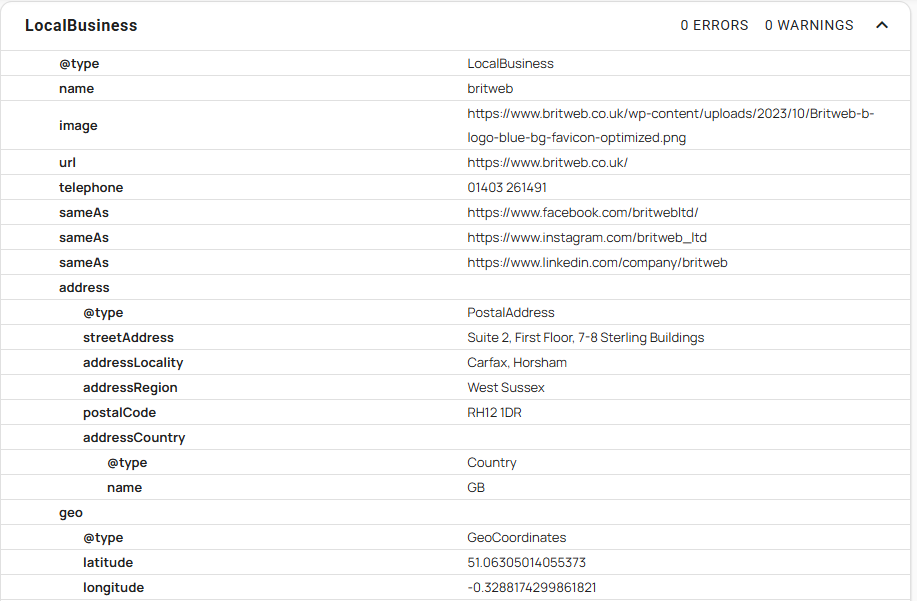To boost your SEO with schema markup, the key is to provide search engines with the necessary context they need. By implementing structured data, you help search engines interpret your web pages more accurately, display detailed information, and unlock rich snippets that make your content stand out in the search results pages.
Adding structured data not only improves visibility in Google search results and other search engines but also ensures your content is ready for the future of search, where AI-driven assistants, voice search, and large language models (LLMs) are shaping how information is discovered and presented. Schema markup provides your site with the clarity these systems require to understand your content and show it in both conventional search results and AI-powered answers.
At britweb, we help businesses implement schema markup as part of a wider SEO strategy, combining technical expertise with digital marketing experience. From improving your visibility in search engines to positioning your brand for AI-driven discovery, our team ensures structured data is applied in ways that deliver measurable results.
If you’d like to learn more about our digital marketing services, including SEO and Generative Engine Optimisation, please call 01403 261491 or complete our contact form. We’ll be happy to help.
What is schema markup?
Schema markup is a type of code, also called structured data, that you add to your website’s HTML. Its purpose is to give search engines extra context about your content. Instead of just seeing plain text, search engines receive clear labels that explain the meaning of each piece of information.
This code is usually written in a format called JSON-LD (JavaScript Object Notation for Linked Data). In simple terms, JSON-LD is a way of structuring information so it’s simpler for machines to read and understand. For example, schema can tell Google whether a number on your site is a price, whether a date refers to an event, or whether a title belongs to an article.
Without schema, search engines have to make educated guesses about your content, which can lead to mistakes or missed opportunities. With schema, they gain semantic value, providing a deeper understanding of your content and making it easier to display rich, accurate results in search.
By using schema markup, you’re essentially adding a translation layer between your website and search engines, helping them interpret your pages correctly and improving your chances of appearing in enhanced search results.
Why schema matters for conventional SEO
Schema markup strengthens traditional SEO by making your content easier for search engines to understand and interpret, so they can directly recognise the meaning of your data. This clarity improves how your pages are displayed and ranked in Google search results and across other search engines.
Enhancing search results with rich features
When you add schema, your listings become eligible for rich results such as:
- Star ratings
- FAQs
- ‘People Also Ask’ results
- Step-by-step instructions
- Product details like price and availability
- Event information, such as dates and locations
- Recipe data, including cooking time and ingredients
- Video enhancements like thumbnails and key moments
- Breadcrumbs to show your site structure
These extra features make your content stand out on the search results page, improve user engagement metrics, and often lead to higher click-through rates (CTR).
Local SEO with local business schema
For local businesses, implementing the local business schema type is especially valuable. It provides Google and other search engines with accurate details, such as your address, opening hours, and customer reviews. This increases your chances of appearing in local search results, mobile search results, and the Google Maps local pack, which helps nearby customers find you.

Here is britweb’s own LocalBusiness schema from our homepage, as rendered by the Schema Markup Validator tool.
Improved clarity for search engines
Schema also reduces ambiguity. For example, if your website mentions “Apple,” schema markup can clarify whether you mean the fruit or the technology company. This prevents search engines from misinterpreting your content and ensures the right audience finds your site.
Supporting mobile search
Many schema-powered features, such as collapsible FAQs or event listings, are designed with mobile users in mind. This creates a better user experience on smaller screens and supports SEO as Google prioritises mobile-first indexing.
Why schema matters for AI and voice search
Schema markup isn’t just important for traditional SEO; it’s also vital for how search is evolving with AI and conversational queries. As more people use voice search and rely on AI assistants or even large language models (LLMs), such as ChatGPT, schema ensures that your content is structured in a way these systems can accurately understand and present.
Voice search responses
Devices like smart speakers and mobile voice assistants rely heavily on structured data to provide quick answers. By marking up your content with schema, you make it eligible to be read out in voice search responses, presenting your brand clearly and authoritatively. For example, a restaurant with the local business schema can have its opening hours spoken directly back to a user searching “Is this café open now?”.
AI-driven search and assistants
Search engines like Google are increasingly using AI to generate overviews and summarised answers. Similarly, AI assistants and LLMs pull from structured content to respond to user queries. With schema, a recipe site can present ingredients and cooking steps directly in Google search results, while a services company using FAQ schema can have its answers appear in conversational AI responses.
Preparing for an AI-first future
By adding schema, you’re not just helping search engines today – you’re helping to future-proof your site for the AI-first landscape. As AI systems evolve, they will increasingly prioritise content that’s clearly structured and semantically tagged. Schema markup gives your website the best chance of being discovered and trusted by both search engines and AI-powered discovery tools.
Types of schema markup to prioritise
Different schema markup types serve different purposes. Choosing the right ones depends on your business goals and the content you want to optimise. The chart below shows the main schema markup types, with examples and how they can be used to strengthen your SEO strategy.
| Schema Type | Examples | Best For |
|---|---|---|
| Content and publishing | Article schema (Article), Blog posting schema (BlogPosting), How-to schema (HowTo), FAQ schema (FAQPage) | Blogs, guides, tutorials, and editorial content that benefit from clarity in Google search results and visibility in AI assistants or voice search |
| Local and organisational | Local business schema (LocalBusiness), Organisation schema (Organization), Service schema (Service) | Local SEO: address, opening hours, services, and building brand authority |
| E-commerce and products | Product schema (Product), Offer schema (Offer), Review schema (Review), Certification schema (New in 2025) | Online shops and retail pages where detailed product data (including certifications) support rich results |
| Events and engagement | Event schema (Event), Breadcrumb schema (BreadcrumbList) | Event listings and site navigation that need better visibility in search results pages |
| Video and multimedia | Video schema (VideoObject) | Video content enhanced with rich features like thumbnails, durations, and key moments in Google search results |
| Customer loyalty and rewards | Loyalty Program schema (New in June 2025) | Businesses offering memberships or reward schemes, helping search engines display loyalty benefits and perks directly in Google search results |
Prioritising the right schema types ensures your site provides clear signals to search engines, making your content more visible, relevant, and competitive.
Implementing schema markup
Here’s a clear, step-by-step process for implementing schema markup:
- Audit your website content: Start by identifying the pages where schema will add the most value, such as product pages, FAQs, blog posts, or your homepage.
- Select schema types: Match the right schema to the right content. For example, use the FAQ schema (FAQPage) for support pages or the local business schema (LocalBusiness) for local SEO.
- Generate schema markup: Tools like Google’s Structured Data Markup Helper or SEO plugins in your content management system (CMS) make it easy to generate the necessary code. Most will provide it in JSON-LD format, which is Google’s recommended approach.
- Add schema markup to your site: Place the JSON-LD code snippet into your website’s HTML, usually in the <head> section. Alternatively, you can deploy it using Google Tag Manager if you prefer not to edit code directly.
- Validate your structured data: Test your markup using tools such as Google’s Rich Results Test or the Schema Markup Validator. This ensures it has been added correctly and is eligible for rich results.
- Monitor with Google Search Console: Use the Enhancements reports in Search Console to track improvements, discover new opportunities, and fix any flagged errors.
By following these steps, you help ensure that your structured data is implemented correctly, which in turn helps boost your long-term SEO performance.
Summary
Schema markup serves as a bridge between your content, search engines, and the expanding ecosystem of AI-driven discovery tools, including voice assistants and large language models (LLMs). By structuring your data clearly, you make it easier for search engines to understand your site, unlock rich results that drive higher engagement, and position your content for visibility in both traditional search and AI-powered responses.
The value of schema lies in both the immediate benefits, like earning rich snippets, powering local search results, or enhancing product listings, and the long-term ability to remain competitive as search continues to evolve. Implementing schema isn’t just a technical SEO task; it’s about making your content clear, trustworthy, and discoverable in today’s search landscape and the AI-first future.
Improve your website’s performance with britweb
At britweb, we implement and optimise structured data markup across our digital marketing clients’ websites, as part of a wider digital marketing strategy. From auditing your site and selecting the right schema markup types to testing and monitoring, we ensure your schema is not only correctly applied but also adds measurable value.
If you’re ready to boost your SEO with schema markup and expert digital marketing strategies, contact our team today.
Schema markup FAQ
Are schema markup and structured data the same thing?
Not exactly. Structured data is a broad term for any code that organises and labels content so machines can understand it. Schema markup is the most widely used form of structured data, based on the shared vocabulary from Schema.org – a collaborative project that provides a standardised set of definitions for different types of content. In practice, when people talk about adding structured data for SEO, they almost always mean using schema markup.
How can structured data help my content appear in Google’s “People Also Ask” box?
Using concise answers structured with schema helps Google interpret your content more clearly. This increases your chances of appearing in People Also Ask (PAA) boxes, as Google favours direct, well-formatted responses. While not guaranteed, schema significantly improves discoverability in these interactive sections.
Why might FAQ rich results only appear for authoritative sites in certain industries?
Some rich result features, particularly those using the FAQ schema, are reserved for highly trusted sites, especially in areas such as healthcare or government. Google applies stricter criteria in these cases to ensure accuracy and authority. Even if rich results don’t appear, adding schema still improves how search engines understand your content.
Will Google always display my FAQ schema as rich results after implementation?
Not always. Even if schema is valid, Google may choose not to display rich results due to factors like duplicate content, low site authority, or algorithmic changes. That’s why it’s important to monitor progress in Google Search Console, fix flagged issues, and ensure on-page content matches your schema.
Do I need a developer to implement schema markup, or can it be done with plugins?
You don’t always need a developer; many content management systems (CMSs), such as WordPress or Shopify, offer SEO plugins that can automatically generate and add schema. However, for more complex implementations (such as multiple schema types on the same page or custom JSON-LD code), developer input ensures accuracy and precision. Whichever route you take, always test and validate your structured data to confirm it is working correctly.


